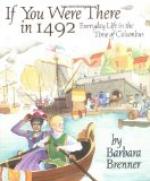Attack by Indians.
But rumours soon reached the Adelantado of a projected attack on the settlement by the natives, and he took measures to seize Quibia in his own palace. The Indians, dismayed at the capture of their cacique, offered large quantities of gold for his ransom, but the Adelantado preferred to keep him as a hostage for peace. However, as he was being conveyed down the river, on board one of the boats, he managed, although bound hand and foot, and in the custody of one of the most powerful of the Spaniards, to spring overboard and to make his escape, swimming under water to the shore. Henceforward, as might have been expected, there was war to the knife between the natives and the settlers. An attempt was made to burn down the village by means of blazing arrows. A boat’s crew of eleven Spaniards, who had proceeded some distance up the river, were attacked by savages in canoes, and only one man escaped to carry to the settlement the news of the massacre of his companions.
Settlement abandoned.
The admiral, with three of the caravels, was in the offing, awaiting a wind favourable for his departure, but the dry weather had made the river so shallow that it was impossible for the caravel left with the settlers to cross the bar, and as they had no boat strong enough to weather the surf, it seemed impossible for them to carry to him tidings of their condition. They were in despair; for if they were left, they knew that they were left to perish. The admiral, on his part, had become uneasy, not knowing that their failure to communicate with him was owing to the fact that their only seaworthy boat had been destroyed by the Indians. His own boats were small and scarcely weathertight. But some of Quibia’s family who had been taken on board the squadron as prisoners, had made their escape by swimming to the shore, three miles off; and this feat encouraged a bold pilot of Seville, named Ledesma, who was on board the admiral’s caravel, to attempt a similar exploit. Never was bearer of reprieve for the condemned more welcome. Ledesma communicated with the Adelantado, and conveyed to the admiral intelligence of the desperate state of affairs. The result was, that when in a few days the wind moderated, all the settlers were taken on board the squadron, which now only consisted of three ships, as it was found necessary to abandon the caravel which had been left inside the harbour bar.




